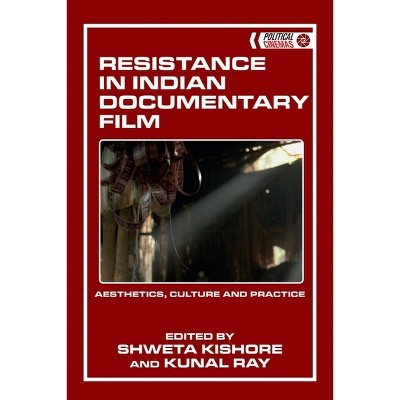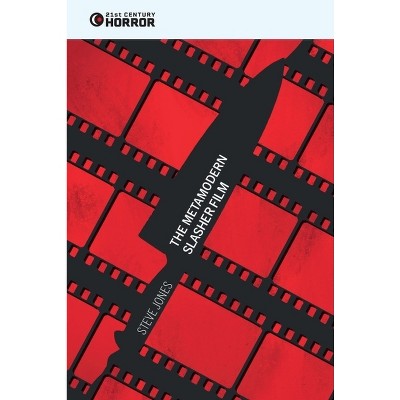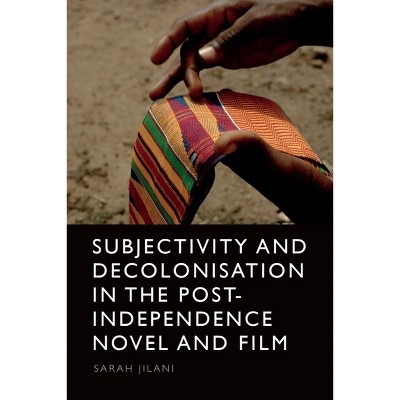Film and Domestic Space - by Stefano Baschiera & Miriam de Rosa (Paperback)

About this item
Highlights
- Although film and media studies have widely engaged with the different aspects of social space, domestic space in film has rarely been studied in its multiple dimensions.
- About the Author: Stefano Baschiera is Senior Lecturer in Film Studies at Queen's University Belfast.
- 256 Pages
- Performing Arts, Film
Description
About the Book
Drawing on a broad range of theoretical disciplines - and with case studies of directors such as Chantal Akerman, Agnès Varda, Claire Denis and Todd Haynes - this book goes beyond the representational approach to the analysis of domestic space in cinema, in order to look at it as a dispositif.
Book Synopsis
Although film and media studies have widely engaged with the different aspects of social space, domestic space in film has rarely been studied in its multiple dimensions. Drawing on a broad range of theoretical disciplines - and with case studies of directors such as Chantal Akerman, Agnès Varda, Claire Denis, Todd Haynes, Amos Gitai, Martin Ritt, John Ford, Ila Bêka and Louise Lemoine - this book goes beyond the representational approach to the analysis of domestic space in cinema, in order to look at it as a dispositif.
Adopting this innovative two-fold approach that couples representation and dispositif, the home is studied as an architecture, as the place that embodies, defines and perpetuates the family history, as the milieu of gender and generational struggle, as well as the first site where manifestations of power unfold. All chapters contribute to explore, unpack the complexities and expand on the richness encapsulated in the notion of domesticity and dwelling in its fascinating relation to moving images.
From the Back Cover
Film and Domestic Space: Architectures, Representations, Dispositif Edited by Stefano Baschiera and Miriam De Rosa Although film and media studies have widely engaged with the different aspects of social space, domestic space in film has rarely been studied in its multiple dimensions. Drawing on a broad range of theoretical disciplines - and with case studies of directors such as Chantal Akerman, Agnès Varda, Claire Denis, Todd Haynes, Amos Gitai, Martin Ritt, John Ford, Ila Bêka and Louise Lemoine - this book goes beyond the representational approach to the analysis of domestic space in cinema, in order to look at it as a dispositif. Adopting this innovative two-fold approach that couples representation and dispositif, the home is studied as an architecture, as the place that embodies, defines and perpetuates the family history, as the milieu of gender and generational struggle, as well as the first site where manifestations of power unfold. All chapters contribute to explore, unpack the complexities, and expand on the richness encapsulated in the notion of domesticity and dwelling in its fascinating relation to moving images. Stefano Baschiera is Senior Lecturer in Film Studies at Queen's University Belfast. Miriam De Rosa is Research Fellow at the Centre for Postdigital Cultures, Coventry University, and an independent film and exhibition curator.Review Quotes
Film and Domestic Space is a rich and thought-provoking edited collection that successfully manages to show how domestic space is far from being a stable concept.--Cristina Formenti, Università degli Studi di Udine "Cinéma & Cie"
Film and Domestic Space is a very well-curated and thought-provoking collection which brings together varied conceptual and methodological approaches to domestic space. It is a welcome addition to scholarship on space and place in cinema and an extremely useful resource for both research and teaching.--Lawrence Webb "Alphaville: Journal of Film and Screen Media"
Film and Domestic Space offers a robust investigation of the myriad relations between film and domestic space. With attention to the different kinds of domestic spaces represented across various global cinemas, the volume considers the central place of home in the cinema, and of the cinema in the home.--Professor Pamela Wojcik, University of Notre Dame
Overall this collection characterizes very convincingly the domestic as a liminal space, a threshold where the relationship with the external world is constantly reframed and never fully contained. [...] the attention to shifting forms of spectatorship provided by many of these essays can only add to this timely book's general appeal.--Anna Viola Sborgi "Screen"
About the Author
Stefano Baschiera is Senior Lecturer in Film Studies at Queen's University Belfast. His work on European cinema, material culture, and film industries has been published in a variety of edited collections and journals including Film International, Bianco e Nero, New Review of Film and Television Studies, and NECSUS: European Journal of Media Studies. With Russ Hunter is the co-editor of Italian Horror Cinema (2016).
Miriam De Rosa is Research Fellow at the Centre for Postdigital Cultures, Coventry University. She researches and publishes on film theories, experimental cinema, artists' moving images and screen media arts. She is the author of Cinema e Postmedia (2013), the editor of Post-what? Post-when? Thinking moving images beyond the postcinema condition (with Vinzenz Hediger, 2016) and of the forthcoming Gesture (2019). De Rosa also works as an independent film and exhibition curator.
Shipping details
Return details
Trending Non-Fiction











